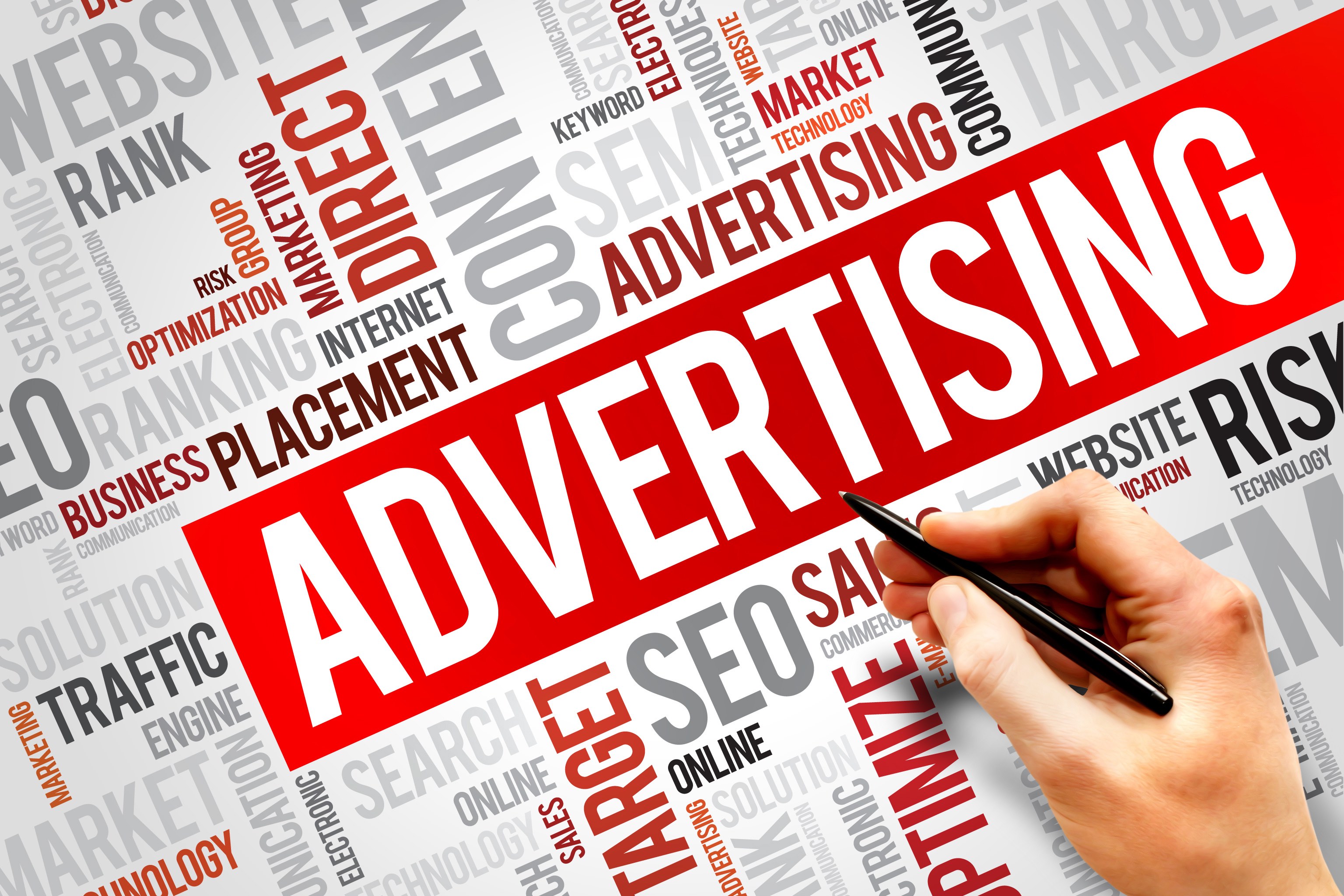Bạn có thể sẽ gặp câu hỏi về chủ đề “Tiếp thị - Quảng cáo” (Advertising) trong bài thi IELTS, đặc biệt là phần Speaking. Dưới đây là bộ từ vựng về advertising siêu “đắt” và ví dụ cách áp dụng chúng vào câu trả lời mẫu trong phần Speaking IELTS để bạn tự tin trả lời giám khảo. Còn chần chừ gì nữa, hãy bắt đầu học thôi nào!

1. Từ vựng chủ đề Advertising:
- advertising agency (n) - a company that creates adverts for other companies : Công ty quảng cáo
Ví dụ: He's a junior level executive at an advertising agency.
- advertising budget (n) - the amount of money a company decides to spend on advertising: ngân sách dành cho quảng cáo
Ví dụ: The company trimmed £46,000 from its advertising budget.
- brand awareness (n) - how well people know a particular brand: Sự nhận thức về thương hiệu (khách hàng biết rõ về thương hiệu tới đâu)
Ví dụ: This may be anything from increasing brand awareness to improving specific aspects of the brand image.
- brand loyalty (n) - the degree to which people continue to buy from the same brand or company : lòng trung thành với thương hiệu
Ví dụ: All manufacturers want to encourage brand loyalty to their own products.
- buy and sell (v) - often used to refer to the buying and selling of items between individuals: mua và bán
Ví dụ: The program allows clients to buy and sell mutual fund shares without paying commissions.
- call to action (n) - something that encourages someone to take a particular action, such as making a purchase or clicking a link on a website: cách bạn hấp dẫn người dùng social media, thu hút sự chú ý của họ vào hành động kế tiếp mà bạn muốn họ làm thế
Ví dụ: Your site needs to have a simple, clear and effective call to action to get them moving.
- celebrity endorsement (n) - to have a well-known person promote a product: Mời người nổi tiếng làm gương mặt đại diện cho các sản phẩm của công ty hoặc một chiến dịch quảng cáo
Ví dụ: Strategies vary from innovative bottle design and unusual ingredients through to fulsome use of celebrity endorsement.
- classified ads (n) - small advertisements often put in a newspaper or magazine by individuals: Các mẩu quảng cáo nhỏ (trên báo, tạp chí,…)
Ví dụ: You should check the employment office and the classified ads for job openings.
- to cold call (v) - to call someone with the aim of selling something without them asking you to do so: chào hàng qua điện thoại
Ví dụ: When you cold–call a prospect, what obstacles do you expect the clerical staff to put in your way ?
- commercial break (n) - the short period during TV programmes when advertisements are shown: Các mẩu quảng cáo ngắn xen giữa các chương trình trên TV
Ví dụ: During a commercial break, we met another lovely and somebody who plays defensive back engaged in witty banter.
- commercial channel (n) - TV channels that make money from showing advertisements: kênh truyền hình kiếm tiền bằng việc đăng quảng cáo
Ví dụ: Denmark's first commercial channel went on air on June 1, 1987.
- to go viral (v) - to quickly become extremely popular on the Internet through social media: phổ biến và lan truyền nhanh chóng trên Internet hoặc các phương tiện truyền thông
Ví dụ: Their amazing video of the project has now gone viral with millions of views.
- junk mail (n) - unwanted promotional leaflets and letters: tờ rơi quảng cáo
Ví dụ: They frown on people spamming strangers with junk mail, but they cannot do anything to prevent it.
- to launch a product (v) - to introduce a new product: giới thiệu một sản phẩm mới trên thị trường
Ví dụ: An entrepreneur we interviewed was given the opportunity to launch a new product for a major international company.
- mailing list (n) a list of names and contact details used by a company to send information and advertisements: Danh sách khách hàng gửi mail quảng cáo
Ví dụ: The organizer of the mailing list monitors the discussion, ejects troublesome members and blocks inappropriate messages.
- mass media (n) - large media outlets like TV, newspapers and magazines: các phương tiện thông tin đại chúng như TV, báo, tạp chí,..
Ví dụ: The mass media, especially television, usurped the job the parties traditionally performed in reaching out to the people.
- niche product (n) - a product that is aimed at a distinct group of people: một sản phẩm mà bạn đặt mục tiêu vào một nhóm khách hàng chuyên biệt
Ví dụ: Cypress now plans to concentrate on static RAMs, programmable logic devices and its high-performance niche product lines.
- to place an advert (v) - to put an advert somewhere: đăng quảng cáo ở đâu đó
Ví dụ: Your best hope of obtaining a copy is to place an advert in the classifieds.
- press release (n) - something written by a company for newspapers and magazines and websites to share and publish: Lời tuyên bố phát cho báo chí và các phương tiện truyền thông
Ví dụ: Every press release should include a quotable, provocative statement from an officer or committee member of the organization involved.
- prime time (n) - the time during the viewing schedule when most people watch TV or listen to a broadcast: giờ vàng (trong phát thanh, truyền hình)
Ví dụ: They ran a series of television advertisements, which they placed in prime time they purchased early in the campaign.
- product placement (n) - to advertise a product by using it as a prop in a TV show or film: một dạng quảng cáo thương hiệu sản phẩm, dịch vụ trong các bộ phim, chương trình truyền hình
Ví dụ: Product placement has been allowed for more than a month now, and the UK viewing audience certainly seems to have mixed feelings about the new form of marketing.
- sales page (n) - a page specifically used to promote a product or service: Trang dùng cho quảng cáo sản phẩm hoặc dịch vụ
Ví dụ: I want it to go at the top of my product sales page, it's only a short 30 second clip with sales talk and someone chatting
- to show adverts (v) - to display adverts on TV: trình chiếu quảng cáo trên TV
Ví dụ: Showing adverts on Facebook is currently the best way to advertise product.
- social media (n) - websites that enable users to create and share content or to participate in social networking: mạng xã hội
Ví dụ: He argues that most social media exercises draw far too few hits to warrant the personnel costs associated with maintaining them.

- spam email (n) - unwanted, promotional email: Email là tin quảng cáo, email không mong muốn
Ví dụ: Spam emails are always annoying to users.
- target audience (n) - the people a company want to sell their product or service to: Khách hàng mục tiêu
Ví dụ: First, the company established a psychographic profile of the target audience by asking men about their likes and dislikes as they used both the products and the packaging in their grooming ritual.
- word of mouth (n) - recommendations made by individuals to other individuals about a product of service: Sự giới thiệu từ người dùng này tới người dùng khác về sản phẩm
Ví dụ: McDonald's marketing has the effect of conscripting America's children into an unpaid drone army of word-of-mouth marketers, causing them to nag their parents to bring them to McDonald's.
2. Từ vựng Topic Advertising mô phỏng trong IELTS Speaking

Part 1-style questions
Examiner: Are there any TV channels in your country that don’t have adverts?
Loraine: No … they’re all commercial channels and show adverts all day long … too many really … and there’s also a lot of product placement going on … especially in soap operas where they place an item just behind the actors.
Examiner: Do you enjoy watching adverts on TV?
Karin: No … not really … I hate commercial breaks during a film … it really spoils the flow … and during prime time viewing they seem to squeeze even more ads in than usual … celebrity endorsements also get on my nerves … everyone knows they’re only doing it because they’re getting paid.
Examiner: What are the best ways for ordinary people to advertise something they want to sell in your country?
Marianne: The simplest way is to place an advert in something like the classified ads section of a local paper … or there’s the Internet of course … there are lots of sites like eBay where you can buy and sell things online.
Part 2-style task
Describe an advert you once saw that was very effective. You should say
- where this advert appeared
- when you saw it
- what it was advertising
and say why you thought it was so effective.
Max: OK … well this was about 4 years ago … I was looking for some software to create videos … one day I got an email from a mailing list I’d signed up to … there was a link in it to a press release … a company had written something about a new product that was similar to what I was looking for … at the end of the press release there was a link to the sales page … I hadn’t heard of the company but I was interested and clicked the link to the ad …. what caught my attention immediately were the number of testimonials from people who had bought the software … I think testimonials are like the online equivalent of word of mouth advertising and are really persuasive … anyway … when I got to the bottom of the page there was a great big call to action button inviting me to buy … I was totally persuaded and ended up making a purchase … what made it so effective I think was the power of those testimonials … they’d been written by people very much like me … they’d had a need and the software had obviously turned out to be just what they were looking for … when you think that this was a newish company they wouldn’t have had any brand awareness at all … they probably wouldn’t have had much of a budget for advertising … obviously you wouldn’t advertise a product like this through the mass media on TV … they probably didn’t even have an advertising agency to support them …and yet they’d managed to create a great deal of brand loyalty from previous customers … I think that was really effective.
Part 3-style questions
Examiner: What is it that makes an advert effective?
Spencer: Well … when a company launches a product they have to consider the Internet … especially how it can be used to spread the word on social media … so in this context a video that goes viral is probably the most effective type of advert you could make.
Examiner: What are the advantages to companies of advertising on the Internet rather than TV?
Stelios: I’d imagine the main advantage is you can reach your target audience much more effectively … if you bring out a niche product for example … or you have a tight advertising budget … you can advertise on particular sites that the people you want to reach visit … that’s not something you can do on TV.
Examiner: What things do advertising companies do that might give it a bad name?
Raol: For me the most irritating is cold calling … we must get two or three of these every day at work … then there’s junk mail that gets posted through the letterbox … and of course the online equivalent of this … spam emails … I think it’s this kind of advertising that tends to annoy people.








